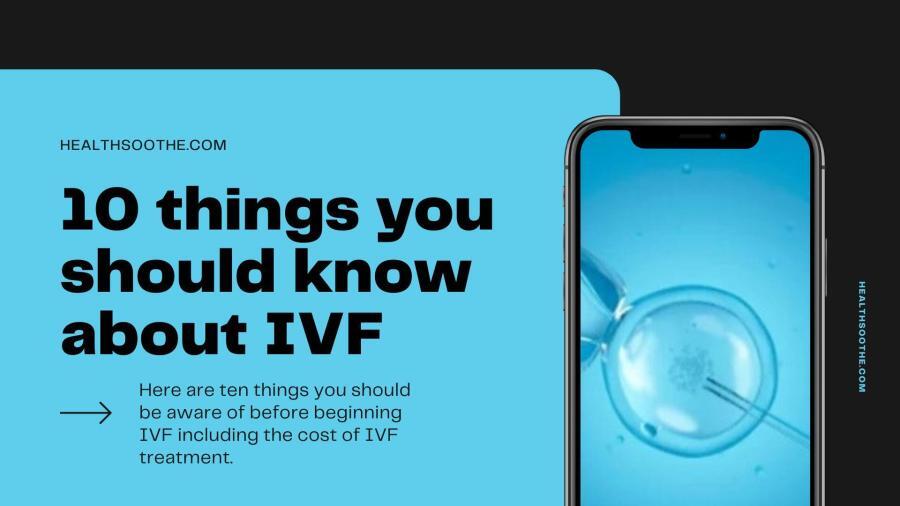Deciding to have IVF may be both thrilling and nerve-wracking. You should get ready for the unpredictable trip that IVF may be psychologically, physically, emotionally, and financially.
Here are ten things you should be aware of before beginning IVF including the cost of IVF treatment.
- 1. Prepare your body for IVF
- 2. Infertility is not uncommon
- 3. There are different types of IVF available
- 4. Cost Of IVF
- 5. Age matters
- 6. You will need time and patience
- 7. It may be painful and uncomfortable
- 8. IVF disturbs the hormonal balance
- 9. Sperm Quality Also Matters
- 10. . There are side effects; however, they are rare
1. Prepare your body for IVF
Even with IVF, the majority of people are unaware of how crucial their overall health is to conception. Your body must first be in good form if it is going to consent to support life for nine months.
Your hormonal balance, which in turn affects your fertility and capacity to conceive, is impacted by your body weight and fat percentage.
Poor habits and a sedentary lifestyle can harm sperm in men as well, which can make it more difficult to conceive a child. The good news is that while human sperm have a short 74-day life cycle, you may easily increase sperm count and health by changing a few aspects of your lifestyle.
2. Infertility is not uncommon
Approximately 1 in 6 couples experience infertility, making it a fairly prevalent problem. The causes of infertility are typically shared by the woman in 40% of cases and the men in 40% of cases, with 20% coming from a combination of both. IVF is used to help conceive in about 5% of infertile couples. Other fertile people, such as same-sex couples, single women, those with genetic diseases, and those who want to have a rescue sibling, also use IVF. As a result, IVF is now used to deliver one in every fifty babies.
3. There are different types of IVF available
Although traditional IVF is the most prevalent form, it is neither the only treatment option nor always the best option. Other, less drug-intensive treatment options exist as well. The least demanding method is natural IVF, which doesn’t involve any stimulant medication. Natural Modified IVF only needs 3–4 days’ worth of medication, whereas Mild IVF (or tiny IVF) needs 5–9 days’ worth of medication.
4. Cost Of IVF
In the US, a whole IVF cycle typically costs around $12,000, not including medications. It is frequently higher in big cities. A whole in vitro cycle without drugs can cost as much as $15,000 in some low-cost IVF programs, which charge much less than the industry average.
5. Age matters
The success rates of fertility treatments increase with the age at which they are administered. Fertility starts to diminish in women at the age of 35 and quickly increases during their 30s and 40s. Because of this, getting pregnant after the age of 40 is significantly more challenging, and getting pregnant after the age of 45 has substantially lower chances of success.
6. You will need time and patience
IVF is a laborious, intrusive, and invasive process. There isn’t a way to avoid it. Initial treatment planning, stimulation monitoring, egg retrieval, semen analysis, and other appointments will take up a lot of your time. A typical cycle might last three to four weeks, however, the exact length will depend on your unique situation. Your body’s reaction will have a significant impact on how well the treatment goes.
7. It may be painful and uncomfortable
Contrary to popular belief, injectable medications do tend to have some side effects, including cramps, bloating, breast tenderness, mood swings, headaches, and abdominal pain, even if they are not particularly uncomfortable to administer.
8. IVF disturbs the hormonal balance
Regular hormonal injections are given to women undergoing IVF, which may cause them to feel the urge to have sex or have menopausal hot flashes.
9. Sperm Quality Also Matters
Similar to the egg, the sperm’s quality is important. Sperm quality is influenced by the number, motility, and shape of the sperm. The fertilization process is greatly facilitated by high-quality sperm.
10. . There are side effects; however, they are rare
IVF side effects for women can include bloating, mood swings, fatigue, and headaches. Rarely, some people may develop an uncomfortable fluid build-up in their abdomen.

Isreal olabanji a dental assistant and public health professionals and has years of experience in assisting the dentist with all sorts of dental issues.
We regularly post timely and trustworthy medical information and news on Fitness, Dental care, Recipes, Child health, obstetrics, and more.
The content is intended to augment, not replace, information provided by your clinician. It is not intended nor implied to be a substitute for professional medical advice. Reading this information does not create or replace a doctor-patient relationship or consultation. If required, please contact your doctor or other health care provider to assist you to interpret any of this information, or in applying the information to your individual needs.




